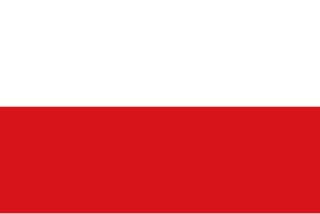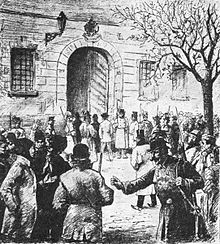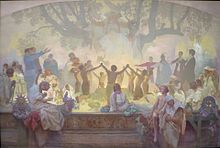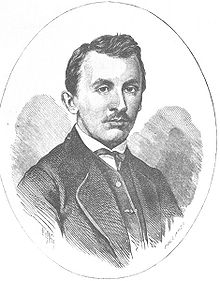Radical Party may refer to any of a number of political parties professing the progressive-liberal ideology known as Radicalism:

The Revolutions of 1848 in the Austrian Empire were a set of revolutions that took place in the Austrian Empire from March 1848 to November 1849. Much of the revolutionary activity had a nationalist character: the Empire, ruled from Vienna, included ethnic Germans, Hungarians, Slovenes, Poles, Czechs, Slovaks, Ruthenians (Ukrainians), Romanians, Croats, Venetians and Serbs; all of whom attempted in the course of the revolution to either achieve autonomy, independence, or even hegemony over other nationalities. The nationalist picture was further complicated by the simultaneous events in the German states, which moved toward greater German national unity.

The Austro-Hungarian Compromise of 1867 established the Dual Monarchy of Austria-Hungary.
The Radicals were a loose parliamentary political grouping in Great Britain and Ireland in the early to mid-19th century who drew on earlier ideas of radicalism and helped to transform the Whigs into the Liberal Party.

The Sokol movement is an all-age gymnastics organization first founded in Prague in the Czech region of Austria-Hungary in 1862 by Miroslav Tyrš and Jindřich Fügner. It was based upon the principle of "a strong mind in a sound body". The Sokol, through lectures, discussions, and group outings provided what Tyrš viewed as physical, moral, and intellectual training for the nation. This training extended to men of all ages and classes, and eventually to women.

Karel Kramář was a Czech politician. He was a representative of the major Czech political party, the Young Czechs, in the Austrian Imperial Council from 1891 to 1915, becoming the party leader in 1897.

Svetozar Marković was a Serbian political activist, literary critic and socialist philosopher. He developed an activistic anthropological philosophy with a definite program of social change. He was called the Serbian Nikolay Dobrolyubov.

Radicalism was a political movement representing the leftward flank of liberalism during the late 18th and early 19th centuries and a precursor to social liberalism, social democracy, civil libertarianism, and modern progressivism. This ideology is commonly referred to as "radicalism" but is sometimes referred to as radical liberalism, or classical radicalism, to distinguish it from radical politics. Its earliest beginnings are to be found during the English Civil War with the Levellers and later the Radical Whigs.

Václav Jaroslav Klofáč was a Czech politician and one of the founders of the Czech National Social Party. He was born in 1868 in Německý Brod. Klofáč became one of the best known radical nationalist Czech politicians in the Habsburg monarchy.

Karel Baxa was a Czech politician in Austro-Hungarian Monarchy and then in Czechoslovakia. He is most known for his long term position as mayor of Prague.

The Young Czech Party was formed in the Bohemian crown land of Austria-Hungary in 1874. It initiated the democratization of Czech political parties and led to the establishment of the political base of Czechoslovakia.
The Czech Realist Party officially Czech Progressive Party founded as Czech People's Party was founded in 1900 by Tomáš Masaryk, Karel Kramář and Josef Kaizl. It attempted to reform the Czech Government and establish a democracy in response to the Hilsner Trial. Following the Hilsner Trial, Masaryk became a key point of controversy and ultimately he felt that he needed to break from the Young Czechs and the Old Czechs. This led to the creation of the Czech Realist Party.

The Revolutions of 1848, known in some countries as the Springtime of the Peoples or the Springtime of Nations, were a series of revolutions throughout Europe over the course of more than one year, from 1848 to 1849. It remains the most widespread revolutionary wave in European history to date.
The People's Radical Party was the dominant ruling party of Kingdom of Serbia and later Kingdom of Serbs, Croats and Slovenes from the late 1880s until 1928.

Young Slovenes were a Slovene national liberal political movement in the 1860s and 1870s, inspired and named after the Young Czechs in Bohemia and Moravia. They were opposed to the national conservative Old Slovenes. They entered a crisis in the 1880s, and disappeared from Slovene politics by the 1890s. They are considered the precursors of Liberalism in Slovenia.
The Croat-Serb Coalition was a major political alliance in Austria-Hungary during early 20th century that governed the Croatian lands, the crownlands of Croatia-Slavonia and Dalmatia. It represented the political idea of a cooperation of Croats and Serbs in Austria-Hungary for mutual benefit. Its main leaders were, at first Frano Supilo and Svetozar Pribićević, then Pribićević alone.

Sava Grujić was a Serbian politician, statesman, general, army officer, and author, serving five times as Prime Minister of the Kingdom of Serbia under two different monarchs from 1887 to 1906.

In the history of Austria-Hungary, trialism was the political movement that aimed to reorganize the bipartite Empire into a tripartite one, creating a Croatian state equal in status to Austria and Hungary. Franz Ferdinand promoted trialism before his assassination in 1914 to prevent the Empire from being ripped apart by Slavic dissent. The Empire would be restructured three ways instead of two, with the Slavic element given representation at the highest levels equivalent to what Austria and Hungary had at the time. Serbians saw this as a threat to their dream of a new state of Yugoslavia. Hungarian leaders had a predominant voice in imperial circles and strongly rejected Trialism because it would liberate many of their minorities from Hungarian rule they considered oppressive.

"Radicalism" or "radical liberalism" was a political ideology in the 19th century United States aimed at increasing political and economic equality. The ideology was rooted in a belief in the power of the ordinary man, political equality, and the need to protect civil liberties.

















